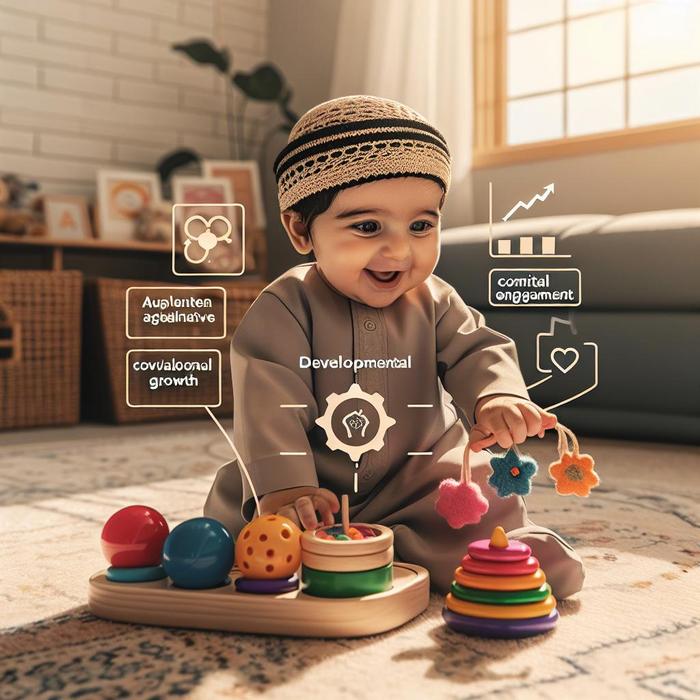Unveiling the Magic of Baby Development Games
Have you ever considered how effective simple games can be in your little one’s growth? As surprising as it may seem, incorporating baby development games into your child’s routine can greatly enhance their cognitive and motor skill development. But how does this work? Let’s dive deeper and discover how you can leverage the power of learning through play.
The Power of Learning through Play
When we talk about nourishing your child, it’s not just about providing them with healthy meals but also with mentally stimulating activities. According to experts, babies learn most effectively when they’re enjoying themselves. This is where the concept of learning through play comes in. It’s more than just fun and games; it plays a crucial role in creating a foundation for your child’s future learning and growth.
Games that Promote Motor Skills
Motor skills refer to the ability to move and manipulate objects. These skills are vital for all aspects of life, from feeding to writing. Here are a few games that can help improve your baby’s motor skills:
- Ball games: Simple toss and catch games improve coordination and fine motor skills.
- Stacking games: Stacking blocks or nesting cups promote hand-eye coordination and spatial awareness.
- Puzzle games: Simple puzzles can help enhance problem-solving skills, hand-eye coordination, and fine motor skills.
By incorporating these simple games into your baby’s daily routine, you can assist in the development of their motor skills in an enjoyable way.
Fueling Cognitive Growth with Play
Studies show that engaging in games from a very young age can accelerate cognitive growth. The brain is like a muscle that grows stronger with exercise, and for babies, play is the best kind of mental workout. Here are a few game ideas:
- Peekaboo: This game helps babies understand the concept of object permanence, an important cognitive milestone.
- Mirroring games: Copying gestures and facial expressions can help your baby learn about communication and empathy.
- Matching games: Simple matching games can enhance memory and problem-solving skills.
Remember, the goal is not to make your baby a genius overnight, but rather to create a rich environment where learning is a natural, pleasurable experience. Games like these are excellent tools for promoting cognitive growth and learning in the early stages of life.
Making the Most of Game Time
While games can be fun and educational, it’s vital to remember that babies need a balance of different activities. Incorporate a blend of solitary play, interactive play, and rest periods. Whether it’s an impromptu game of peekaboo, a planned puzzle-solving session, or simply time spent exploring safe household items, each activity contributes to your baby’s overall development.
Creating a game plan might seem overwhelming, but it’s simply about being present and engaging with your baby in a variety of ways. Set aside dedicated time for play, be responsive to your baby’s interests, and remember – it’s all about having fun!
Importance of Choosing Age-Appropriate Games
As parents, it can sometimes be overwhelming to decide the appropriate games for your child’s development, considering their varying interests and abilities. Hence, it is essential to choose games that cater to your child’s level of development to provide them with just the right amount of challenge. Make sure the goal of the game is neither too hard nor too easy to attain, given the child’s age and ability.
Importance of Variation in Games
Exposing your baby to a variety of games can help stimulate various areas of their brain, thereby fostering a balance in their skill development. By altering between physical games like ball toss and catch, cognitive games like picture matching, and interactive play like peekaboo, babies get to utilize and develop different aspects of their cognitive and physical abilities. Variation in games also helps avoid monotony, keeping your baby engaged and interested in playtime.
Social Skills Development with Games
Interactive games that require participation from another person, like parents or siblings, not only create opportunities for bonding but also help inculcate vital social skills in babies. From understanding turn-taking to picking up on non-verbal cues, these games offer a fun way to introduce your child to the basics of social interaction.
For instance, a simple game of `pass the toy` promotes the concept of sharing while giving your baby a sense of belonging. Similarly, games that involve imitation or echoing can foster empathy and understanding in little ones.
Fostering Creativity through Games
Games are also a wonderful medium to spark creativity and imagination in young minds. For instance, building block games not only promote coordination and balance but also unleash your child’s creative potential. Similarly, role-playing games, where your child can pretend to be a character or mimic everyday adult activities, can foster their imagination and creativity – crucial aspects of cognitive development.
Online Platform for Learning Games
Today, there are several online platforms available that offer a variety of interactive learning games, designed explicitly for child development. Websites like Cybereality offer age-specific games that not only entertain but also help in the skill development of children.
Making Learning a Fun Experience
In the end, the ultimate goal of introducing games into your child’s routine is to make learning an enjoyable process. Ensure that you don’t pressure your child to “win” the game; instead, focus on the participation and learning that comes from it. Celebrate their efforts, be it a half-completed puzzle or an unsuccessful catch, as it is these small steps that pave the way for future learning and growth.
The joy of learning through play contributes to a positive attitude towards learning that can benefit your child throughout their life.

